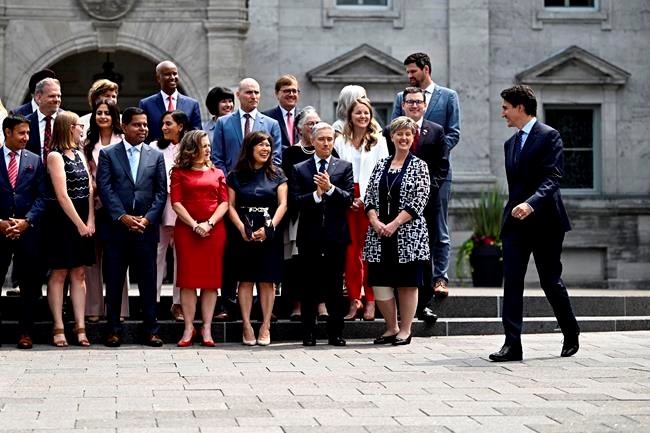OTTAWA — Prime Minister Justin Trudeau moved last month to introduce more diversity into his cabinet but some political experts said the additions won't have much effect unless they go beyond surface-level representation.
Trudeau added seven new faces to his governing team on July 26 including Mississauga MP Rechie Valdez, the first Filipina Canadian woman MP, and Toronto MP Gary Anandasangaree, who is the first Sri Lankan Tamil to serve in cabinet.
Trudeau said in July that the new cabinet is a reflection of Canada's diversity and would bring new voices, skills and experiences to the table.
Many saw the changes as part of an effort by the Liberals to shore up support in tight ridings and among specific ethnic communities.
But Erin Tolley, the Canada Research Chair on gender, race and inclusive politics at Carleton University in Ottawa, said a seat at the table is only one part of true representation — both for the ministers themselves and for the people they represent.
"I think in these particular cases, appointing somebody from those communities does act as a signal that the Liberals are listening, that they value input from that community," said Tolley.
At the same time, it's reductive to speak of changes to cabinet in terms of racial impact, she said. Focusing solely on race instead of policy is a disservice to both diaspora communities and the ministers themselves because it assumes diaspora communities vote primarily on the basis of the racial background, she said.
There's little evidence to suggest voters can be motivated solely on racial grounds, said Tolley, which means a more diverse cabinet isn't likely to dramatically shift voting behaviour among the people they represent come election time.
"You can't simply put diverse faces around a table without also changing the way you do policy and the kinds of policy choices you're making," said Tolley.
Without this, communities could shift their alliances if they feel their support is being taken advantage of and if they're not seeing responsiveness from a government, she said.
Sabreena Delhon, executive director of the Samara Centre for Democracy, said politicians can also feel taken advantage of if they don't receive the supports they need in their new roles.
"If you're going to have someone in a space where they have traditionally been under-represented or have had limited decision-making power, you need to think about what it will take to retain them," Delhon said. "And that relates to creating working conditions that are sustainable and supportive."
Delhon said Samara's podcast, "Humans of the House", which interviews former members of Parliament about their experiences in politics, has helped showcasewhat it means to work on the Hill. The candid conversations have talked about mental health struggles, the gruelling schedules and the steep learning curve MPs face when they receive a promotion.
When diverse MPs are given those promotions, there needs to be mechanisms in place to support their success and retention in the roles, said Delhon.
"If we don't find ways for the House of Commons and the broader workplace culture of politics in Canada to hold on to the best and brightest problem solvers, then the leaders that we need will stop stepping forward altogether."
And, she added, it's not uncommon for racialized politicians to be the subject to threats online which add more stress and mental health struggles to their long list of challenges.
Samara analyzed more than 2.5-million posts on X, formerly known as Twitter, directed toward candidates in the 2021 federal election. About 20 per cent of those tweets were "toxic or abusive," Delhon said, including sexually explicit content and attacks on their identities.
Cabinet shuffle day can be "an exciting day," said Delhon, "but it's important to understand how challenging the path to that position might have been for some," especially those who are racialized.
When Charmaine Williams, a member of provincial parliament in Ontario, was named to Premier Doug Ford's cabinet last year she became the first Black person in cabinet for the conservatives in that province.
She said she's felt supported "every step of the way," both from her colleagues and her constituents — "all those who've been impacted by the various barriers that so many Canadians (and) Ontarians face."
This makes the feelings of support and inclusion even stronger, she said, because she knows folks "understand what it's like to be the first."
Williams was speaking in Ottawa at the end of a summit of the Canadian Congress of Black Parliamentarians. She said collaborating with other Black politicians reminds her that even though they may be the only ones in the room, you're still there with the mandate to fight for all Canadians.
"It's such a great feeling," she said.
This report by The Canadian Press was first published August 11, 2023.
Alessia Passafiume, The Canadian Press




